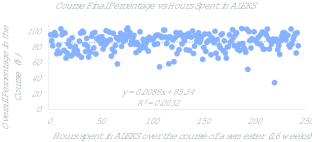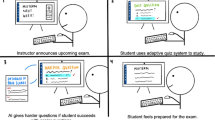Abstract
Online homework systems have been shown to help student achievement in chemistry courses. This study sought to compare the levels of knowledge retention in students over the course of a semester, using two different types of homework systems—the adaptive-responsive system and the traditional-responsive system. Two sections of a first semester general chemistry course were investigated, with one section using the adaptive-responsive system and the other using the traditional-responsive system. Students’ grades on cumulative exams were compared across both sections, and it was found that students using the adaptive-responsive system scored significantly higher on the exams and retained significantly more information than the students in the other section. The results of this study should help inform the choices educators make regarding the homework system they choose to use, or even which parts of the different systems they choose to use or not to use based on the outcomes they would like for their student population.

Similar content being viewed by others
References
Arora, M. L., Rho, Y. J., & Masson, C. (2013). Longitudinal study of online statics homework as a method to improve learning. Journal of STEM Education, 14(1), 36–44.
Burch, K. J. and Kuo, Y-J. (2010). Traditional vs. online homework in college algebra. Mathematics and Computer Education,44 (1), 53–63.
Butler, A. C., Marsh, E. J., Slavinsky, J. P., & Baraniuk, R. G. (2014). Integrating cognitive science and technology improves learning in a STEM classroom. Educational Psychology Review, 26, 331–340.
Cengage (2019). MindTap - The leading digital learning tool. [online]. Available at: https://www.cengage.com/mindtap/ [accessed 28 July 2019].
Centre for evaluation and monitoring, (2019). Effect size resources. [online]. Avaliable at: https://www.cem.org/effect-size-resources [accessed 26 Nov. 2019].
Eichler, J. F., & Peeples, J. (2013). Online homework put to the test: A report on the impact of two online learning systems on student performance in general chemistry. Journal of Chemical Education, 90(9), 1137–1143.
Ertmer, P. A., & Newby, T. J. (1993). Behaviorism, cognitivism, constructivism: Comparing critical features from an instructional design perspective. Performance improvement quarterly, 6(4), 50–72.
Gill, R. (2011). Effective strategies for engaging students in large-lecture, nonmajors science courses. Journal of College Science Teaching, 41(2), 14–21.
Heflin, H., Shewmaker, J., & Nguyen, J. (2017). Impact of mobile technology on student attitudes, engagement, and learning. Computers & Education, 107, 91–99.
Herreid, C. F., & Schiller, N. A. (2013). Case studies and the flipped classroom. Journal of College Science Teaching, 42(5), 62–66.
Hibbard, L., Sung, S., & Wells, B. (2015). Examining the effectiveness of a semi-self-paced flipped learning format in a college general chemistry sequence. Journal of Chemical Education, 93(1), 24–30.
Macmillan Learning (2019). Sapling Learning. [online] Available at: https://www.macmillanlearning.com/college/us/digital/sapling [accessed 28 July 2019].
Mason, D. (2015). Knowledge decay and content retention of students in first-semester general chemistry. Lumat, 3(3), 341–352.
McGraw-Hill, (2019). Overview of ALEKS. [online]. Avaliable at: https://www.aleks.com/about_aleks/overview [accessed 28 July 2019].
McGraw-Hill, (2020). Knowledge Space Theory. [online]. Available at: https://www.aleks.com/about_aleks/knowledge_space_theory [accessed 17 March 2020].
McLeod, G. (2003). Learning theory and instructional design. Learning Matters, 2(3), 35–43.
McLeod, S. A. (2019). What does effect size tell you? Simply psychology [online]. Available at: https://www.simplypsychology.org/effect-size.html [accessed 14 September 2020].
Parker, L. L., & Loudon, G. M. (2012). Case study using online homework in undergraduate organic chemistry: Results and student attitudes. Journal of Chemical Education, 90(1), 37–44.
Pearson (2019). The learning science behind Pearson mastering chemistry. [online]. Avaliable at: https://www.pearsonmylabandmastering.com/northamerica/masteringchemistry/educators/learning-science/index.html [accessed 28 July 2019].
Revell, K. D. (2013). A comparison of the usage of tablet PC, lecture capture, and online homework in an introductory chemistry course. Journal of Chemical Education, 91, 48–51.
Richards-Babb, M., Drelick, J., Henry, Z., & Robertson-Honecker, J. (2011). Online homework, help or hindrance? What students think and how they perform. Journal of College Science Teaching, 40(4), 81–93.
Richards-Babb, M., Curtis, R., Georgieva, Z., & Penn, J. H. (2015). Student perceptions of online homework use for formative assessment of learning in organic chemistry. Journal of Chemical Education, 92(11), 1813–1819.
Richards-Babb, M., Curtis, R., Ratcliff, B., Roy, A., & Mikalik, T. (2018). General chemistry student attitudes and success with use of online homework: Traditional-responsive versus adaptive-responsive. Journal of Chemical Education, 95(5), 691–699.
Roschelle, J., Feng, M., Murphy, R. F., & Mason, C. A. (2016). Online mathematics homework increases student achievement. AERA Open, 2(4), 1–12.
Turner, S., & Peck, D. (2010). Can we do school science better? Facing the problem of student engagement. Education Canada, 49(2), 54–57.
WileyPLUS (2019). Case Studies. [online] Avaliable at: https://www.wileyplus.com/case-studies/ [accessed 28 July 2019].
Williamson, V. M., & Zumalt, C. J. (2017). How do general chemistry students’ impressions, attitutdes, perceived learning, and course performance vary with the arrangement of homework questions and E-text? Chemistry Education Research and Practice, 18, 785–797.
Acknowledgments
The authors would like to thank all the individuals at the University of Oklahoma who willingly participated in this study.
Author information
Authors and Affiliations
Corresponding author
Ethics declarations
Conflict of Interest
The authors declare that they have no conflict of interest.
Ethical Statement
All procedures that were carried out in this study involving human participants were approved by the Institutional Review Board (IRB) at the University of Oklahoma, IRB no. 9489.
Consent Statement
All participants in this student received an online consent form, attached to the online survey, which was approved by the IRB. Study participation was voluntary, and participants were required to accept (or decline) the terms of the consent forms before completing the survey.
Additional information
Publisher’s Note
Springer Nature remains neutral with regard to jurisdictional claims in published maps and institutional affiliations.
Rights and permissions
About this article
Cite this article
Nabulsi, L., Nguyen, A. & Odeleye, O. A Comparison of the Effects of Two Different Online Homework Systems on Levels of Knowledge Retention in General Chemistry Students. J Sci Educ Technol 30, 31–39 (2021). https://doi.org/10.1007/s10956-020-09872-2
Accepted:
Published:
Issue Date:
DOI: https://doi.org/10.1007/s10956-020-09872-2




